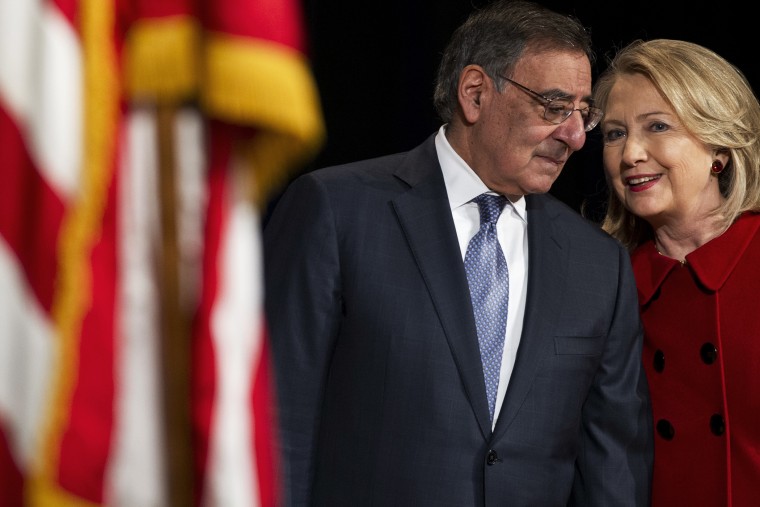Hillary Clinton and former CIA director Leon Panetta go back a long way.
She was the first person the then-congressman met when he walked into the Arkansas Governor’s mansion in 1992, shortly after her husband had won the presidency. “Hillary was warm and welcoming. She extended a hand and spoke briskly. ‘I’m glad you’re here,’” she told him, according to his new memoir, "Worthy Fights."
Now, as Panetta echoes Clinton’s recent criticisms of the president’s foreign policy, some wonder whether she might be grateful for him again — and what he’s hoping to get out of his bridge-burning.
The pointed critique of Obama in "Worthy Fights" — Panetta wrote that the president too often “relies on the logic of a law professor rather than the passion of a leader” — generated headlines. In interviews on his book tour, Obama's former defense secretary portrays the current president as dithering and reactive.
At a book discussion Tuesday night in Washington, Panetta all but endorsed Clinton. “She’s smart, she’s experienced, and she’s tough. What the hell else do you want?” he said. Would he support her if she ran for president again, as he did in the 2008 Democratic primary over Obama? “Sure. Absolutely.”
And there’s plenty more praise for Clinton in the pages of his memoir.
Some progressives, including The Nation magazine and msnbc’s Rachel Maddow, have noted that Panetta now works for a consulting firm co-founded by some Clinton State Department alumni, including longtime spokesperson Philippe Reines. The suggestion is that the Clinton and Panetta camps worked together around the book.
Asked for comment, Reines forwarded a request to a spokesperson for the firm, Beacon Global Strategies. The spokesperson Michael McKeon warned even before a question was put to him that “some questions hatched by conspiracy theorists are too silly to merit a serious reply.”
Asked to debunk the idea that the Clinton and Panetta camps collaborated on the book, McKeon replied: “[E]ncouraging conspiratorial types by advancing silly question doesn’t solve anything. Have a good day.”
A followup email wasn’t returned.
A spokesperson for Panetta’s publisher was no more forthcoming, demurring on an interview request. “Secretary Panetta wrote this book for the readers and Penguin Press is thrilled with their reaction,” the spokesperson said.
RELATED: Panetta hitches raft to Clinton, jettisons Obama
Vice President Joe Biden called Panetta’s criticisms of Obama “inappropriate,” saying Panetta and other former administration officials who write memoirs should at least wait until the president they served is out of office.
Bill Burton, a former White House spokesperson and early Obama campaign aide, suggested that Panetta’s view of events is embellished. “The timing is unfortunate. The version of history is revisionist,” he told msnbc. “But at the end of the day, there are more pressing issues than some book a former administration official is trying to sell.”
Panetta has responded to the criticism by saying that he’s essentially dishing out tough love. He says he wants Obama to succeed and that that will only happen if the president learns from past mistakes. “I don’t think you put history on hold,” he told one interviewer.
Other observers wonder if he has his eye on the next potential occupant of the White House. As The New York Times’ Mark Landler pointed out, Panetta’s book leaves out or downplays some known disagreements he had with Clinton.
It’s not hard to see how Panetta’s criticisms of Obama could help Clinton, who will need to dodge Republican accusations that she’s merely the third term of an unpopular president. They’re similar to ones Clinton herself made in an explosive Atlantic interview earlier this year, when she knocked the president’s “don’t do stupid stuff” mantra and called his decision to not arm Syrian rebels earlier a “failure.”
On issues where Clinton splits from the president, Panetta takes her side. And in other places where Clinton is vulnerable, like the Benghazi attack, he downplays her responsibility.
“It’s like he’s working from a checklist and just going down and hitting each box he needs to, to back up Hillary,” said one former State Department staffer who worked under Clinton and asked to remain anonymous so as not to imperil job prospects in a potential Clinton administration.
Clinton, who faces perils if she distances herself too aggressively from the president, later backed off her criticism in the Atlantic interview.
Obama’s unpopularity is such a conundrum for Clinton allies that some privately joke about urging Joe Biden to run in 2016 so that the vice president assumes the “third term” mantle from Clinton.
Why would Panetta help Clinton? At 76, Panetta seems eager to return to the farm in California that he often flew back to on weekends. It’s hard to imagine what job he would want in Washington that he hasn’t already had.
There are, however, part-time presidential commissions, like the president’s Intelligence Advisory Board. And he could join the top echelon of elder statesmen like Brent Scowcroft and Zbigniew Brzezinski, both of whom have served on the board and seem have endless opportunities to speak or write or consult.
Besides, he’s hardly alone among Democrats — or Americans for that matter — in turning his back on Obama. Former President Jimmy Carter has also chided Obama on similar grounds as Clinton.
And Panetta has known Clinton for over 20 years, writing in his book that she’s one of the “few people in politics whose acumen I more admired.”
Why wouldn’t he want to do everything he could to help make her president — for his party, for his country, and for himself?
